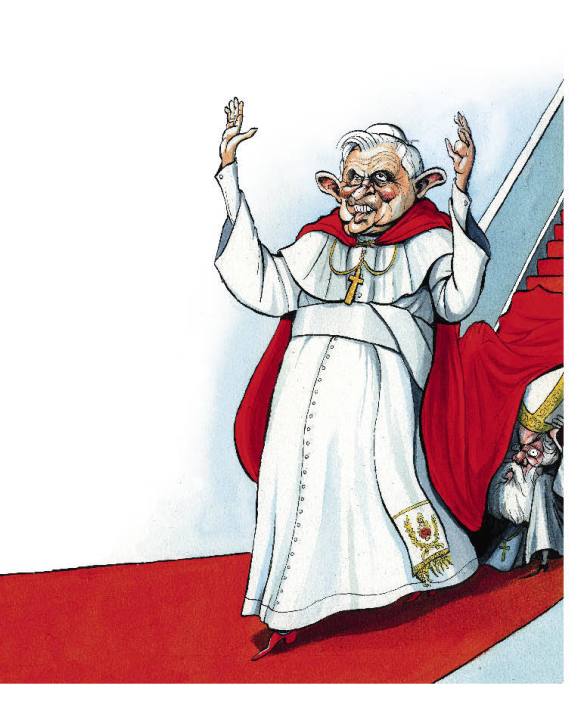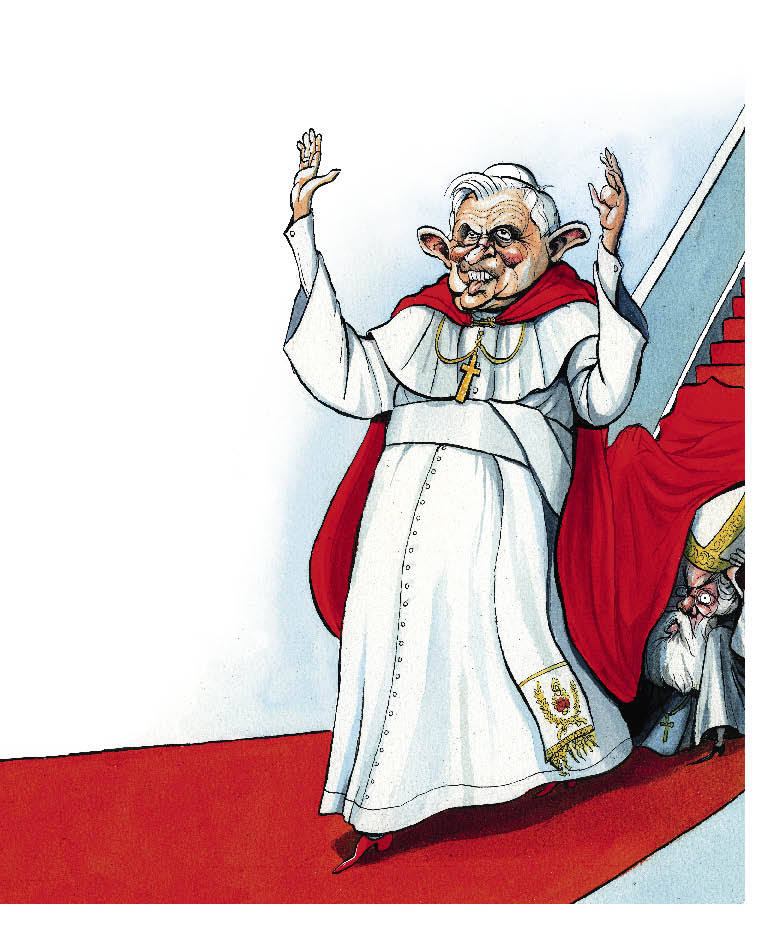What a pity it is that all the hate and slime now directed against the Pope’s visit is not aimed instead at the Church of England. Why do God-haters and militant secularists have to turn on a pensionable German theology professor and head of a Rome-based religious multinational organisation, when they want to condemn the steadfast defence of Christian morality?
For at least some Anglicans, the savaging of the Bishop of Rome will give rise to sinful pangs of envy. We would like Richard Dawkins, Philip Pullman — and, I am rather compelled to mention, my brother Christopher — to be hurling their fiery darts at Thomas Cranmer’s church instead. But these professional scoffers unkindly refuse to scoff at our texts and formularies. They even put in a kind word for the beauty of Evensong, and the poetic majesty of the 1611 Bible and 1662 Prayer Book. In this they are mistaken, as we shall see, though not about the beauty or the majesty. More sensibly, they cannot find it in their hearts to loathe or rail at the exasperated, kindly, furry and baffled figure of Rowan, our Archbishop.
Even so, Dr Williams is not in fact the Church of England, and nor are its current prelates, who squabble and chatter beneath the giant arches of the great cathedrals. A mighty institution, armed with scripture, tradition and reason, and adorned with centuries of poetry, courage and devotion looms behind them. Why is it that a foreign church, whose leader (according to the confident 37th of the 39 articles) ‘hath no jurisdiction in this realm of England’, is the chosen target of the modish ‘new’ atheists? Why is it that, in recent years, it has been generally assumed that any conservative religious person in this country is a Roman Catholic, or about to become one?
Some of the approaching anti-papal protests will be in the old spirit of the Gordon Riots and the Shankill Road, an unreasoning bile against foreign prelacy. This has somehow survived the almost complete disappearance of educated Christian faith, scriptural knowledge, historical consciousness and Protestant observance among the people of these islands. The behaviour of the audience at a recent debate on the Roman Church in Central Hall, Westminster, showed that ancient, howling fury is still available to those who wish to lash it into life, and also that it is perhaps a little embarrassing to those who do so.
Part of this rage, in its current form, is the undeniable problem of priestly paedophilia. But, leaving aside any other subtleties in this scandal, the shrieking tone and lofty righteousness of the condemnation imply that the Vatican actively mandated child sexual abuse by its clergy.
The special condemnation reserved for the Romish church also suggests, absurdly, that such horrors never took place, or were covered up by, liberal secular institutions. They did, and have been. Yet this is never advanced as an argument against the secular liberal state (and it would be a bad argument, if it were).
The sex scandal is not, as it happens, the real reason for the anger directed against the Bishop of Rome. If it were, then the undoubted case against the Roman Catholic hierarchy could be made without all the puce-faced exaggerations, straightforward lies and total lack of proportion which infect it. It is overblown precisely because it is not the true issue, but a pretext.
This is what it is really about: the sons and daughters of the sexual revolution, the inheritors of 1968, are actively infuriated by anyone who dares to suggest that their behaviour in their personal lives might be, or might ever have been, selfish and absolutely wrong. The world glimpsed a premature flash of this militant, intolerant resentment in December 1989, when more than 100 people, swollen with anger at Cardinal O’Connor’s conservative views on abortion and homosexuality, were arrested for trying to disrupt and desecrate Mass at St Patrick’s Cathedral in New York.
But in those days, the protestors only harmed themselves. Mayor Ed Koch called their behaviour an ‘excrescence’ and the liberal New York Times snapped disapprovingly: ‘Far from inspiring sympathy, such a violation mainly offers another reason to reject both the offensive protesters and their ideas.’
In the intervening 21 years, mayors and liberal newspapers (on both sides of the Atlantic) have changed sides, as the 68ers have climbed to the very top of the new establishment. The baby boomers have finally won the cultural revolution, and they know it. They are now the righteous ones. Bob Geldof and Bono are more morally powerful than any cardinal. Their followers know they are good because they care. They worship at the Church of the Environment, in which Salvation comes by faith in windmills and solar panels, and where dissenters are hissed as intolerable and wicked heretics. But they proudly claim that they have never discriminated against anyone in their lives. They are used to defeatism, cowardice and simpering acquiescence from parents, teachers and other figures of authority, who are supposed to be impressed by their blazingly obvious personal superiority to everything and everybody that went before them.
In an astonishing moment of truth last week, some doubt about this triumphalist world view was expressed by Edmund Adamus, an adviser to the Roman Catholic Archbishop of Westminster, Vincent Nichols. Mr Adamus was asked to give his views on the Pope’s visit by an online magazine, Zenit. You may not have heard of either Mr Adamus or of Zenit. Normally both would struggle to win the attention of the wider world. But by one of those strange and rather suspicious processes through which news is created, they were thrust into unexpected prominence.
Why? Mr Adamus said what he actually thought to the magazine. And what he thought was exactly what the secularists hate about Christianity. ‘The fact is that historically, and continuing right now, Britain, and in particular London, has been and is the geopolitical epicentre of the culture of death,’ he said.
‘Our laws and lawmakers for over 50 years or more have been the most permissively anti-life and progressively anti-family and marriage, in essence one of the most anti-Catholic landscapes culturally speaking than even those places where Catholics suffer open persecution.’
The furnaces of fashionable outrage were duly ignited. Ben Summerskill, the homosexual liberation movement’s equivalent (at the very least) of a cardinal archbishop, pronounced loftily that Mr Adamus’s words were ‘gratuitously offensive’ and of course ‘insensitive’. Paul Vallely of the Independent spoke for modern metropolitan society when he alleged that Mr Adamus was seeking to incite a ‘cultural war’.
These responses were perfectly predictable. Less so was the immediate disavowal of Mr Adamus by his own chief. A Church spokesman noted that the interview ‘did not reflect the Archbishop’s opinions’. This was the most interesting part of the story, given that Mr Adamus was more or less repeating the well-known views of the present Pope and his forerunner.
Mr Adamus is not actually saying — as he has been caricatured as doing — that Christians are persecuted here. He is making the important point that the sticky, slow, bureaucratic strangulation of Christianity by the secular state is harder to fight than a direct attack by a frank and open enemy.
The Permissive Society inaugurated in the 1960s, and its successor, the ‘diversity and equality’ programme adopted (partly in fulfilment of EU demands) since the mid-1980s, have hammered their way through most of the structural walls and buttresses of what was until recently an explicitly Christian society. It is true that there are still Bishops in the House of Lords and a few other outward signs of Christian allegiance. But these anomalies in a post-Christian state are unlikely to survive into the second half of this century, and Christianity is now merely tolerated as one of many faiths, not privileged as the founding charter of our civilisation.
The revulsion from the slaughter of unwanted children, the principle which most sharply distinguished Christian civilisation from the pagan world, has been abruptly abandoned thanks to the legalisation of abortion and the casuistry of those who insist that the victims are not in fact human but morally insignificant objects to be called ‘foetuses’.
Equally significantly, the status of lifelong heterosexual marriage has been transformed. In 1960, it was the only form of sexual relationship to which our society gave recognition in law, or regarded as respectable. Now it is a minority lifestyle choice, competing on unequal terms with cohabitation and serial semi-polygamy, heterosexual and homosexual. These things are true whether you approve of them or not.
I would very much like to know which parts of the Adamus analysis are rejected by the English hierarchy of the Roman Catholic Church. If we knew, then it would be far easier for the radical enemies of Pope Benedict to grasp that the Roman Catholic Church is far from united behind the sort of conservatism embraced by the last two Popes. And that many liberal Roman Catholics would be far from broken-hearted if this visit were an embarrassing failure — a failure that would help to ensure that Benedict would be the last conservative Pope. Reformers who did not dare challenge the gigantic, unassailable John Paul II can see that their day is coming. Benedict’s apparent rock-like strength conceals a grave weakness.
If the next Pope returns to the liberalism of the days before John Paul II, conservative Christians in this country will no longer be able to seek asylum in Rome, where they would soon find exactly the thing they flee from.
Yet perhaps by reoccupying and recapturing the citadels of their own Church, rather than by defecting to another one, English-speaking Christian conservatives might discover that they have a surprisingly powerful weapon in their hands, one that has not ceased to exist just because it has fallen out of use.
They might consider that Thomas Cranmer’s Book of Common Prayer, despite all the assaults of fashion and cultural revolution, remains authorised by law for use in the Church of England, and remains its standard of belief and worship — though, astonishingly, many theological colleges do not even teach its use to their students. And they might note that its beautiful, neglected services — not only Evensong but many others including the Solemnisation of Matrimony — are the most eloquent and thoughtful repudiation of the spirit of 1968 in the English language. If the 68ers actually studied it, they would hate it far more than they hate the Pope, which seems to me to be a good reason for the rest of us to make it our revolutionary manifesto against the sick spirit of the age.
Peter Hitchens is a columnist for the Mail on Sunday and the author of The Rage Against God.







Comments